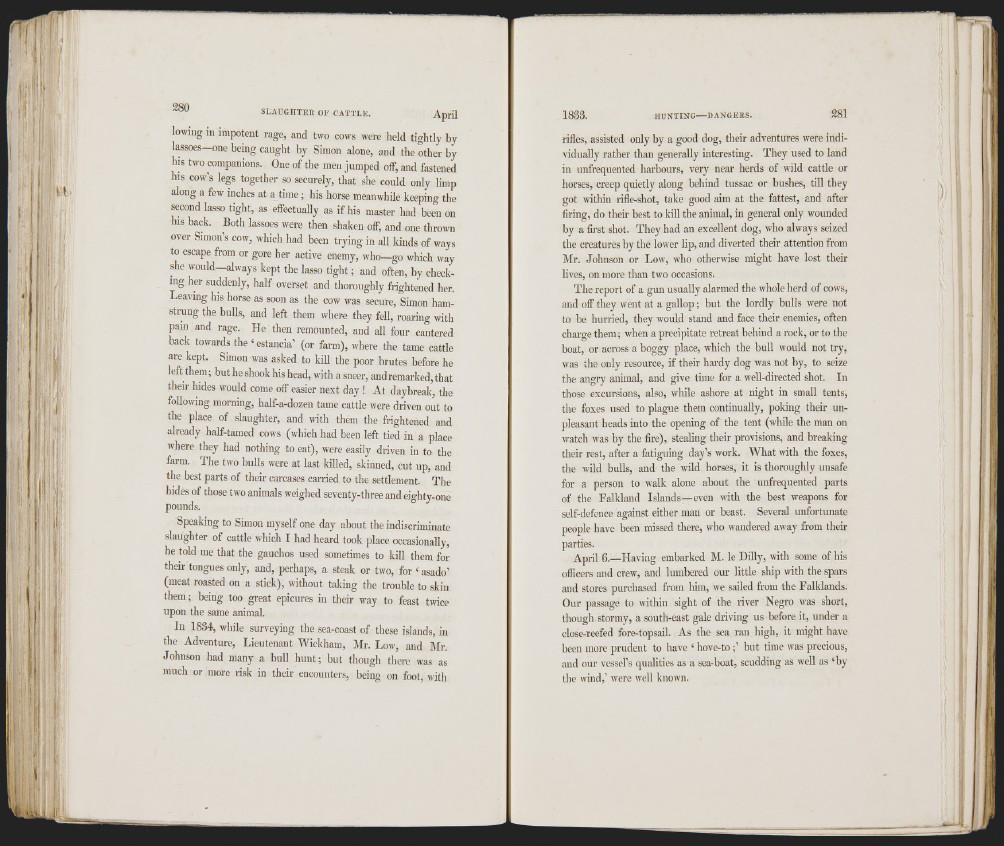
)
lowing in impotent rage, and two cows were held tightly hy
lassoes—one heing caught hy Simon alone, and the other hy
his two companions. One of the men jumped off, and fastened
his cow’s legs together so securely, that slie could only limp
along a few inches at a time ; his horse meanwhile keeping the
second lasso tight, as effectually as if his master had heen on
his hack. Both lassoes were then shaken off, and one thrown
over Simon’s cow, which had heen trying in all kinds of ways
to escape from or gore her active enemy, who—go which way
rile would—always kept the lasso tig h t; and often, hy checking
her suddenly, half overset and thoroughly frightened her.
Leaving his horse as soon as the cow was secure, Simon hamstrung
the hulls, and left them where they fell, roaring with
pain and rage. He then remounted, and all four cantered
hack towards the ‘ estancia’ (or farm), where the tame cattle
are kept. Simon was asked to kill the poor brutes before he
left them; but he shook his head, with a sneer, and remarked, that
their hides would come off easier next day ! At daybreak, the
following morning, half-a-dozen tame cattle were driven o7t to
the place of slaughter, and with them the frightened and
already half-tamed cows (which had been left tied in a place
where they had nothing to eat), were easily driven in to the
farm. The two hulls were at last killed, skinned, cut up, and
the best parts of their carcases carried to the settlement. The
hides of those two animals weighed seventy-three and eighty-one
pounds.
Speaking to Simon myself one day about the indiscriminate
slaughter of cattle which I had heard took place occasionally,
he told me that the gauchos used sometimes to kill them for
their tongues only, and, perhaps, a steak or two, for ‘ asado’
(meat roasted on a stick), without taking the trouble to skin
them; being too great epicures in their way to feast twice
upon the same animal.
In 1834, while surveying the sea-coast of these islands, in
the Adventure, Lieutenant Wickham, Mr. Low, and Mr.
Johnson had many a bull hunt; but though there was as
much or more risk in their encounters, being on foot, with
rifles, assisted only by a good dog, their adventures were individually
rather than generally interesting. They used to land
in unfrequented harbours, very near herds of wild cattle or
horses, creep quietly along behind tussac or bushes, till they
got within rifle-shot, take good aim at the fattest, and after
firing, do their best to kill the animal, in general only wounded
by a first shot. They had an excellent dog, who always seized
the creatures by the lower lip, and diverted their attention from
Mr. Johnson or Low, who otherwise might have lost their
lives, on more than two occasions.
The report of a gun usually alarmed the whole herd of cows,
and off they went at a gallop; but the lordly bulls were not
to be hurried, they would stand and face their enemies, often
charge them; when a precijiitate retreat behind a rock, or to the
boat, or across a boggy place, which the bull would not try,
was the only resource, if their hai-dy dog was not by, to seize
the angry animal, and give time for a well-directed shot. In
those excursions, also, while ashore at night in small tents,
the foxes used to plague them continually, poking their unpleasant
heads into the opening of the tent (while the man on
watch was by the fire), stealing their provisions, and breaking
their rest, after a fatiguing day’s work. What with the foxes,
the wild bulls, and the wild horses, it is thoroughly unsafe
for a person to walk alone about the unfrequented parts
of the Falkland Islands—even with the best weapons for
self-defence against either man or beast. Several unfortunate
people have been missed tliere, who wandered away from their
parties.
April 6.—Having embarked M. le Dilly, with some of his
officers and crew, and lumbered our little ship with the spars
and stores purchased from him, we sailed from the Falklands.
Our passage to within sight of the river Negro was short,
though stormy, a south-east gale driving us before it, under a
close-reefed fore-topsail. As the sea ran high, it might have
heen more prudent to have ‘ hove-to ;’ but time was precious,
and our vessel’s qualities as a sea-boat, scudding as well as ‘hy
the wind,’ were well known.
l.a' •
1 ■